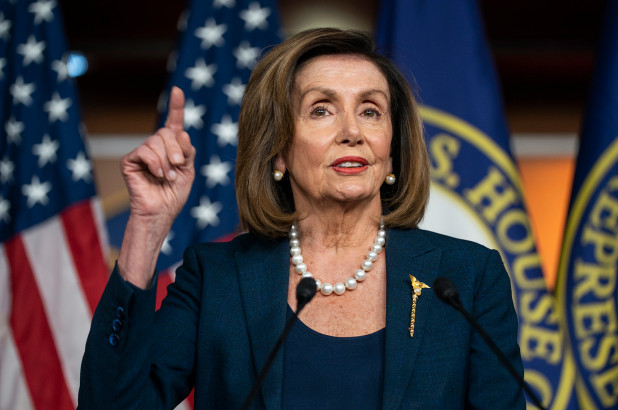For much of the last three years, the impeachment of President Trump seemed inevitable. The left refused to accept his 2016 victory and remained determined to end his tenure.
When he made mistakes or said dumb things, the frenzy boiled over. When his tax and regulation cuts unleashed the great American jobs machine, the resistance grew more determined.
After Democrats seized the House in 2018, Speaker Nancy Pelosi became the firewall against impeachment. By the time she surrendered last fall, Pelosi had adopted the fiery zeal of a convert.
She now displays her hatred of Trump without reservation and accuses him of being a Russian agent, notwithstanding that special counsel Robert Mueller concluded otherwise. Anyone who disagrees with her is accused of being part of a criminal coverup, including Senate Majority Leader Mitch McConnell and Attorney General Bill Barr.
Given Pelosi’s position, these extraordinary accusations are unprecedented in modern times. Yet such vile extremism is the new normal on the left, which uses Trump as an excuse for its own abnormal conduct.
A top Pelosi henchman, Rep. Jerry Nadler, argued last week that, despite the coming election, impeachment must go forward now. Waiting wasn’t an option, he claimed, because the Ukraine case proves beyond a doubt that Trump is “trying to cheat in that election.”
Impeachment, and presumably conviction and removal, are needed to stop the president “from conspiring with a foreign government as the Russian government attempted to rig our last election.”
“We have to proceed,” Nadler insisted, “because the integrity of the election is at stake.”
So impeachment is not just for past acts but also for imagined future ones. By that logic, a 2021 impeachment is guaranteed if Trump wins re-election and Dems keep the House.
Indeed, if as expected the current impeachment ends in acquittal, it’s not far-fetched to believe there could be another one even before November. When you hate a president this much, you can never have too many impeachments.
Besides, the mere talk of removing Trump gets more attention — and donations — than anything else the party and its candidates are offering.
Trump returns the antipathy, of course, and his donors open their wallets in support, guaranteeing that the civil war engulfing our politics from sea to shining sea is not going to end soon.
Even the election won’t be a cure. Regardless of who wins in November, it’s impossible to believe that a “Kumbaya” moment is on the horizon.
All of which explains why a new book by F.H. Buckley feels so timely. Called “American Secession,” it examines the growing prospect of a national divorce.
“I see us on a train, bound for a breakup,” Buckley writes.
“In all the ways that matter, save for the naked force of the law, we are already divided into two nations. The contempt for opponents, the Twitter mobs, online shaming and no-platforming, the growing tolerance of violence — it all suggests we’d be happier in separate countries.”
To be clear, Buckley, a professor at George Mason University’s Scalia School of Law, is not advocating secession. But given the political, cultural, social and geographic divides, he believes it is time to consider the hurdles and whether they could be resolved.
He debunks the notion that it can’t happen here, that the carnage of the Civil War forever consigned the idea to the fringe. After surveying modern separatist movements from the breakup of the Soviet Union to Brexit to his native Canada, Buckley predicts that before long, the topic will go mainstream here as well.
Noting that a California independence effort is underway, Buckley believes the Supreme Court would have to take the idea seriously if a state, following a referendum, petitioned for the right to leave. The political class also would be forced to listen.
Smart, slim and provocative, “American Secession” strikes a chord precisely because our polarization grows deeper and more bitter by the day. Buckley’s comparisons to the Civil War era and other nations are instructive, if not always persuasive.
Still, his thesis reinforces the everyday evidence that our political plates have separated. Chants of “USA, USA” happen only at Trump rallies while Democratic candidates put their faith in identity politics and big government.
To be fair, these trends have been at work for decades, but the Trump phenomenon has helped create a chasm that could be too wide to bridge.
The impeachment trial that begins Tuesday is the clearest evidence of a looming national crackup. House Democrats made kangaroo courts look like models of fair play yet still could cobble together just two anemic articles, neither of which alleges an actual crime.
Coming after the three-year hate-fest against Trump, the process and results expose this impeachment as uniquely partisan and spiteful. The Ukraine matter is a piffle, and never before was anything so small used to try to remove a president.
Near the end of “American Secession,” Buckley urges “moderation from both sides, left and right but especially the left, in their desire to enforce their ideas about the good upon the rest of us. For starters, we need a greater tolerance for differences of opinion.”
It sounds so simple and obvious, yet it looks almost impossible to get there from here. What a tragedy.
The feds are coming
The feds are coming, the feds are coming. Hallelujah.
The Post reports two cases where federal officials are exposing or solving criminal justice problems created by city and state officials.
First, the nation’s top immigration official accused Mayor Bill de Blasio’s sanctuary-city policy of contributing to the murder of 92-year-old Maria Fuertes. The feds posted a retainer request on illegal immigrant Reeaz Khan after an earlier arrest on assault charges. But the city turned him loose, and he later allegedly killed Fuertes.
“The policies of the mayor make this city less safe,” said Matthew Albence, acting director of Immigration and Customs Enforcement.
In the second case, the Brooklyn federal prosecutor arrested — and held — Gerod Woodberry, the alleged serial bank robber repeatedly turned loose under the state’s so-called bail-reform law.
Federal prosecutor Richard Donoghue blasted the changes, saying “no sound, rational and fair criminal-justice system” would force judges to release defendants who are determined to commit more crimes.
The help is welcome, the irony is rich. City and state pols relentlessly bash President Trump, but his intervention is necessary to keep New Yorkers safe.
Tongue – and fruit – in cheek
Reader Harold Theurer reacts to the Whitney Museum’s edible art installation of fruits and vegetables by posing a question that reflects the sensibilities of demanding New Yorkers. He writes: “Before I go I’d like to know if the items were locally sourced from a sustainable farm and picked by a diverse group of workers, or were they bought at the local bodega?”
If it ain’t woke …
Breaking news: Some people at The New York Times have a sense of humor about the paper’s bias. I’m told a skeptic there approaches others with the greeting, “Welcome to Wokestan.”






























